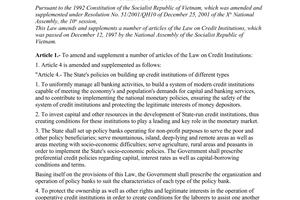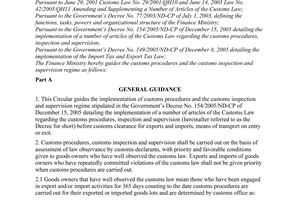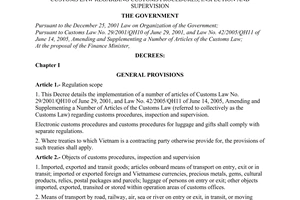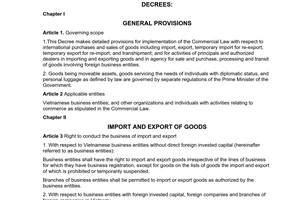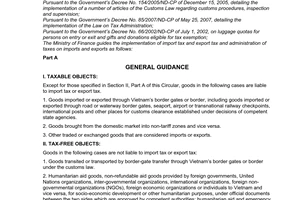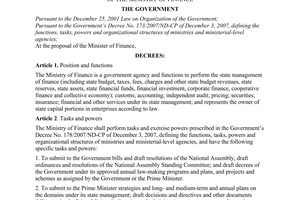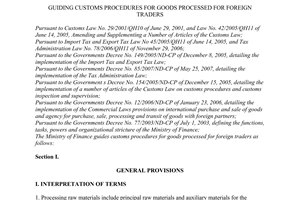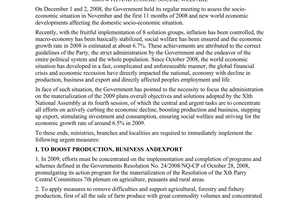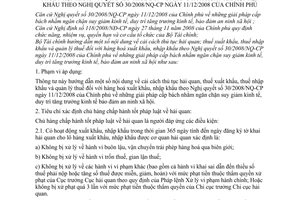Circular No. 05/2009/TT-BTC of January 13, 2009, guiding customs procedures, import tax and export tax and tax administration with respect to imports and exports under the Government’s Resolution No. 30/2008/NQ-CP dated December 11, 2008 đã được thay thế bởi Circular No. 79/2009/TT-BTC of April 20, 2009, guiding customs procedures; customs inspection and supervision; import duty, export duty and tax administration applicable to imports and exports. và được áp dụng kể từ ngày 04/06/2009.
Nội dung toàn văn Circular No. 05/2009/TT-BTC of January 13, 2009, guiding customs procedures, import tax and export tax and tax administration with respect to imports and exports under the Government’s Resolution No. 30/2008/NQ-CP dated December 11, 2008
|
THE MINISTRY OF
FINANCE |
SOCIALIST
REPUBLIC OF VIET NAM |
|
No. 05/2009/TT-BTC |
Hanoi, January 13, 2009 |
CIRCULAR
GUIDING CUSTOMS PROCEDURES, IMPORT TAX AND EXPORT TAX AND TAX ADMINISTRATION WITH RESPECT TO IMPORTS AND EXPORTS UNDER THE GOVERNMENT’S RESOLUTION NO. 30/2008/NQ-CP DATED DECEMBER 11, 2008
Pursuant to the Government’s
Resolution No. 30/2008/NQ-CP dated December 11, 2008, on urgent measures to
curb economic decline, maintain economic growth and assure social security;
Pursuant to the Government’s Decree No.118/2008/ND-CP dated November 27, 2008,
defining the functions, tasks, powers and organizational structure of the
Ministry of Finance;
The Ministry of Finance guides simplified customs procedures; import tax and export tax and tax administration with respect to imports and exports under the Governments Resolution No. 30/2008/NQ-CP dated December 11, 2008, on urgent measures to curb economic decline, maintain economic growth and assure social security, as follows
1. Scope of application:
This Circular guides simplified customs procedures; import tax and export tax and tax administration with respect to imports and exports under the Government’s Resolution No. 30/2008/NQ-CP dated December 11, 2008,on urgent measures to curb economic decline, maintain economic growth and assure social security.
2. Criteria for determining goods owners with a good record of customs law observance
A goods owner with a good record of customs law observance is a person who meets the following conditions:
2.1. If carrying out import or export activities within 365 days counting from the date of registration of a customs declaration for an imported or exported goods lot, he/she has been determined by the customs office as:
a/ Having not yet been handled for cross-border smuggling or illegal transportation of goods;
b/ Having not yet been handled for tax evasion or fraud;
c/ Having not et been handled for other illegal acts (including false declaration resulting in a lower payable tax amount or a higher tax amount eligible for reduction, exemption or refund) subject to a fine falling under the sanctioning competence of directors of provincial-level Customs Departments as stipulated in the Ordinance on Handing of Administrative Violations; or having been sanctioned not more than thrice with a fine falling under the competence of directors of district-level Customs Sub-departments.
2.2. Owing no tax debts overdue for more than 90 days, counting from the deadline for tax payment, at the time of registration of the customs declaration;
2.3. Paying value-added tax by the credit method.
3. Criteria for determining taxpayers meeting the conditions specified at Point a, Clause 4, Article 42 of the Tax Administration Law:
A taxpayer meeting the conditions specified at Point a, Clause 4, Article 42 of the Tax Administration Law, is a person who:
a/ Has a good record of customs law observance as prescribed at Point 2;
b/ Owes no overdue tax debts and fines for late tax payment at the time of registration of the customs declaration.
4. Criteria for determining goods owners who have repeatedly violated the customs law:
A goods owner who has repeatedly violated the customs law is an importer or exporter who, within 365 days counting from the date of registration of a customs declaration for an imported or exported goods lot, has been twice handled for tax fraud or evasion or other violations (including false declaration resulting in a lower payable tax amount or a higher tax amount eligible for reduction, exemption or refund) subject to a fine falling under the sanctioning competence of directors of provincial-level Customs Departments as stipulated in the Ordinance on Handling of Administrative Violations.
Imported or exported goods of a good owner who has repeatedly violated the customs law are subject to inspection at the level specified at Point b, Clause 2, Article 11 of Decree No. 154/2005/ND-CP.
5. Tax payment time limit for supplies and raw materials imported directly for export production:
5.1. For taxpayers who have a good record of customs law observance and owe no overdue tax debts and fines for late tax payment at the time of registration of the customs declaration, the tax payment time limit for supplies and raw materials imported directly for the production of exports (including goods on the list of consumer goods notified by the Ministry of Industry and Trade but directly used for export production) is 275 (two hundred seventy five) days, counting from the date of registration of the customs declaration.
5.2. In special cases in which the cycle of production or the storage duration of supplies and raw materials lasts for more than 275 days, such as shipbuilding, mechanical product manufacture, animal raising, aquaculture, pearl oyster culture; processing of farm produce harvested in seasonal crops, the tax payment time limit may be longer than 275 days. The extended time must not last beyond the delivery deadline indicated in the contracts on export of products produced from imported raw materials and supplies for which extension of the tax payment time limit is requested, or beyond the cycle of production.
5-3. To obtain permission for the application of a tax payment time limit of more than 275 days, in addition to the customs dossier, a customs declarant or taxpayer shall submit to customs office registering the customs declaration the following papers:
a/ A written request (01 original) for application of a tax payment time limit of more than 275 days to each specific case suitable to the storage duration of raw materials and supplies, specifying the reason, the proposed tax amount and extended time, the production process and time;
b/ Papers evidencing the extension of the goods delivery deadline indicated in the export contract, if the goods are eligible for extension of the tax payment time limit to more than 275 days because the goods delivery deadline indicated in the export contract needs to be extended: To submit 01 copy certified by the enterprise director.
5.4. The district-level Customs Sub-department with which the import customs declaration is registered shall receive and examine the dossier and process the case as follows:
a/ If the dossier is complete and the taxpayer is qualified, it shall report the case to the Customs Department for written permission to extend the tax payment time limit to more than 275 days. If the taxpayer is unqualified, it shall notify in writing the taxpayer thereof.
b/ If it is necessary to examine the actual cycle of production or storage duration of supplies and raw materials, the local Customs Department shall collaborate with the tax office and other concerned agencies in conducting examination. A written record on the examination must be made, indicating the cycle of production for which extension of the tax payment limit is requested.
6. Raw materials and supplies imported for export production eligible for the tax payment time limit guided at Point 5 of this Circular include:
6.1. Raw materials, semi-finished products, details and assemblies directly used in the production process to constitute the exports;
6.2. Raw materials and supplies directly used in the export production process but neither transformed into nor constituting the products;
6.3. Finished products imported by enterprises for attachment to or packaging together with products for export produced from imported raw materials supplies or for packaging together with products for export produced from locally procured raw materials and supplies into complete goods items for export;
6.4. Packing materials or packages of products for export;
6.5. Raw materials and supplies imported for warranty, repair and reprocessing of products for export;
6.6. Sample goods imported for the production of goods for export which must be re-exported to foreign customers after completion of contracts.
7. Consumption norm and proportion of scraps and discarded products:
Consumption norm of imported raw materials and supplies serving as a basis for consideration of import tax refund or non-collection is the actual quantity used for the production of products actually exported, including the proportion of scraps and discarded products within the consumption norm recovered in the process of production of exports from imported raw materials and supplies.
7.1. The proportion of scraps and discarded products within the consumption norm recovered in the process of production of exports from imported raw materials and supplies is not liable to import tax. If they are still of some commercial value and are sold by taxpayers on the market, then they are not liable to import tax but are liable to value-added tax and enterprise income tax according to regulations.
7.2. When declaring consumption norms of raw materials to customs offices, enterprise directors shall declare and take responsibility before law for the importation and use of raw materials and supplies for the production of exports and their actual consumption norms in production, including the proportion of scraps and discarded products within the consumption norm recovered in the process of production of exports. If failing to make such declaration or making untruthful declaration, taxpayers shall fully pay import tax on the quantities of imported raw materials and supplies at the prescribed tax rate and be administratively sanctioned according to regulations.
7.3. Consumption norms of raw materials and supplies shall be formulated by enterprises and notified in writing to customs offices before carrying out procedures for exporting the first lot of products concerned.
7.4. The formulation and declaration of norms comply with the Finance Ministry's Circular No.112/2005/TT-BTC guiding customs procedures, inspection and supervision, and Circular No. 59/2007/TT-BTC dated June 14, 2007, guiding import tax, export tax and tax administration with respect to imports and exports.
7.5. For scraps and discarded products within the use norm, consumption norm and wastage rate of processed goods in accordance with Article 31 of the Government's Decree No. 12/2006/ND-CP dated January 23, 2006, and agreed upon in processing contracts and notified in writing to customs offices under the Finance Ministry's Circular No. 116/2008/TT-BTC dated December 4, 2008, their import tax is similar to that applicable to scraps and discarded products in the case of importation of raw materials and supplies for export production stated at this Point 7.l.
8. Regarding tax payment in order:
8.1. The order of tax payment is defined in Article 45 of the Tax Administration Law.
8.2. If at the time of registration of the import customs declaration a taxpayer owes some tax debt which is overdue for less than 90 days from the deadline for full tax payment, he/she may have his/her goods released on the following conditions:
a/ The taxpayer has a written commitment to completely pay the overdue tax debt to the Customs Department to which he/she owes the tax debt at least 20% of such tax debt on a monthly basis, which must not below VND 200 million/payment.
b/ The tax amount registered for payment according to plan must be guaranteed by a credit institution or another organization operating under the Law on Credit Institutions. Such guarantee must comply with the Finance Ministry’s Circular No. 59/2007/TT-BTC dated June 14, 2007, guiding import tax, export tax and tax administration with respect to imports and exports.
c/ The tax payer shall, before receiving goods, pay the tax amount for the declaration being processed by the customs office.
8.3. While being allowed to pay tax later than the plan already registered with the customs office, the taxpayer shall still pay a fine for late payment according to regulations for the tax amount registered to be paid according to the plan but are not subject to coercive measures specified in Article 93 of the Tax Administration Law.
8.4. The taxpayer shall fully pay the tax amount and a fine for late payment as committed. If he/she breaches his/her commitment, the customs office shall order him/her to pay tax in the order prescribed by the Tax Administration Law.
9. Tax refund dossiers and procedures:
Tax refund dossiers and procedures applicable to cases eligible for tax refund comply with the Finance Ministry's Circular No. 59/2007/TT-BTC dated June 14, 2007, guiding import tax, export tax and tax administration with respect to import and exports. Particularly for import and export customs declarations and via-bank payment documents in the dossier of request for tax refund, they are guided as follows:
9.1. Import and export customs declarations: The taxpayer shall submit 01 original. The customs office carrying out customs procedures shall examine the liquidity of the tax amount eligible for refund or non-collection and append the stamp of goods eligible for tax refund or non-collection on the original customs declaration submitted by the taxpayer, duplicate the original customs declaration for which the tax has been already liquidated or refunded before returning it to the taxpayer and filing the copy in the tax refund dossier kept at the customs office.
9.2. Via-bank payment documents:
9.2.l. In case an enterprise is required to submit via-bank payment documents and its dossier is eligible for tax refund prior to examination, if, upon submitting a dossier for tax liquidation or refund, the enterprise cannot produce via-bank payment document, the customs office shall collaborate with the tax agency managing the taxpayer in checking accounting books and documents, warehousing/ex-warehousing bills and warehouse cards and, when necessary, shall additionally examine, verify and compare them against the taxpayer’s business transactions with related organizations and individuals.
9.2.2. The examination must be completed within 15 days after the receipt of a dossier. If examination results show that the goods have been actually exported and all related documents are proper, tax liquidation or refund shall be permitted for enterprises.
9.2.3. Pending the availability of examination results, the taxpayer may apply the tax payment time applicable to those satisfying the conditions specified at Point a, Clause 4, Article 42 of the Tax Administration Law, and is temporarily not subject to coercive measures specified in Article 93 of the Tax Administration Law provided:
a/ The taxpayer only owes the tax on raw materials and supplies imported for export production and has submitted to the customs office a tax liquidation or refund dossier lacking via-bank payment documents;
b/ The taxpayer has made a written commitment to comply with the customs office's final decision.
9.2.4. If examination, verification and comparison results show that the goods are ineligible for tax liquidation, refund or non-collection, the taxpayer will be disallowed to apply the tax payment time limit applicable to those satisfying the conditions specified at Point a, Clause 4, Article 42 of the Tax Administration Law, and will be subject to coercive measures specified in Article 93 of the Tax Administration Law.
10. Commendation and discipline:
10.1. Individuals and organizations that properly observe regulations on customs management will be commended and rewarded according to the State's general regulations.
10.2. Individuals and organizations that unintentionally or intentionally violate regulations on customs procedures, inspection and supervision shall, depending on the nature and seriousness of violation, be administratively sanctioned or examined for penal liability in accordance with law.
10.3. Customs officers carrying out customs procedures or conducting customs inspection and supervision who commit acts of harassment badly affecting import and export activities shall, depending on the nature and seriousness of violation, be disciplined or examined for penal liability; and, if causing damage, shall pay compensations therefor in accordance with law.
11. Organization of implementation:
11.1. This Circular takes effect 45 (forty five) days from the date of its signing, applies to import and export customs declarations registered with customs offices on and after January 1, 2009, and replaces relevant provisions of the Finance Ministry's Circular No. 112/2005/TT-BTC dated December 15, 2005, Circular No. 59/2007/TT/BTC and other documents contrary to this Circular.
11.2. Competent customs offices shall carry out customs procedures, apply import tax and export taxes and perform tax administration with respect to imports and exports strictly according to current documents and this Circular. They shall report specifically any arising problems to the Ministry of Finance (the General Department of Customs) for guidance.
11.3. In the course of implementation, if documents referred to in this Circular are amended, supplemented or replaced, the amended, supplemented or new documents will apply.
|
|
FOR
THE MINISTER OF FINANCE |

